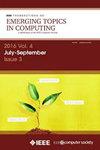Energy Efficient Approximate Computing Framework for DNN Acceleration Using a Probabilistic-Oriented Method
IF 5.4
2区 计算机科学
Q1 COMPUTER SCIENCE, INFORMATION SYSTEMS
IEEE Transactions on Emerging Topics in Computing
Pub Date : 2025-01-02
DOI:10.1109/TETC.2024.3522307
引用次数: 0
Abstract
Approximate computing (AxC) has recently emerged as a successful approach for optimizing energy consumption in error-tolerant applications, such as deep neural networks (DNNs). The enormous model size and high computation cost of DNNs present significant challenges for deployment in energy-efficient and resource-constrained computing systems. Emerging DNN hardware accelerators based on AxC designs selectively approximate the non-critical segments of computation to address these challenges. However, a systematic and principled approach that incorporates domain knowledge and approximate hardware for optimal approximation is still lacking. In this paper, we propose a probabilistic-oriented AxC (PAxC) framework that provides high energy savings with acceptable quality by considering the overall probability effect of approximation. To achieve aggressive approximate designs, we utilize the minimum likelihood error to determine the AxC synergy profile at both application and circuit levels. This enables effective coordination of the trade-off between energy and accuracy. Compared with a baseline design, the power-delay product (PDP) is significantly reduced by up to 83.66% with an acceptable accuracy reduction. Simulation and a case study of the image process validate the effectiveness of the proposed framework.基于面向概率方法的DNN加速节能近似计算框架
近似计算(AxC)最近成为一种成功的方法,用于优化容错应用中的能耗,如深度神经网络(dnn)。深度神经网络庞大的模型尺寸和高昂的计算成本给在节能和资源受限的计算系统中的部署带来了重大挑战。新兴的基于AxC设计的深度神经网络硬件加速器选择性地近似计算的非关键部分,以解决这些挑战。然而,目前还缺乏一种结合领域知识和近似硬件来实现最优逼近的系统的、原则性的方法。在本文中,我们提出了一个面向概率的AxC (PAxC)框架,该框架通过考虑近似的总体概率效应来提供高节能和可接受的质量。为了实现激进的近似设计,我们利用最小似然误差来确定应用级和电路级的AxC协同配置文件。这使得能量和精度之间的权衡得到有效的协调。与基线设计相比,功率延迟积(PDP)显著降低高达83.66%,精度降低可接受。仿真和图像处理的实例研究验证了该框架的有效性。
本文章由计算机程序翻译,如有差异,请以英文原文为准。
求助全文
约1分钟内获得全文
求助全文
来源期刊

IEEE Transactions on Emerging Topics in Computing
Computer Science-Computer Science (miscellaneous)
CiteScore
12.10
自引率
5.10%
发文量
113
期刊介绍:
IEEE Transactions on Emerging Topics in Computing publishes papers on emerging aspects of computer science, computing technology, and computing applications not currently covered by other IEEE Computer Society Transactions. Some examples of emerging topics in computing include: IT for Green, Synthetic and organic computing structures and systems, Advanced analytics, Social/occupational computing, Location-based/client computer systems, Morphic computer design, Electronic game systems, & Health-care IT.
 求助内容:
求助内容: 应助结果提醒方式:
应助结果提醒方式:


